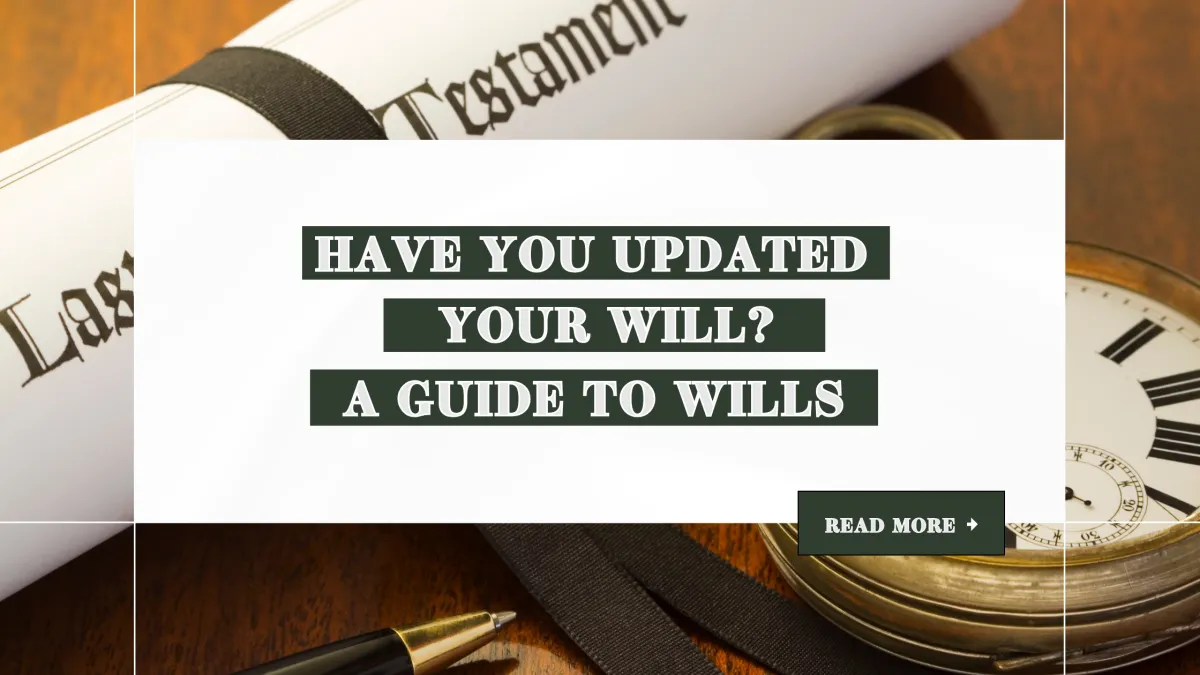Need a resource to guide you?
While the information in our blogs is of a general nature, we want to help you get the answers you need. Scroll below to see the different articles we have on offer.

Have you updated your will? A guide to wills
When it comes to estate planning, most Australians know they should have a will (do they?) - but many don't realise how easily their wealth can unintentionally leave their bloodline after they're gone.
We regularly see situations where family wealth ends up with in-laws, step-relations, or completely outside the family because of inadequate estate planning.
What exactly is a Will?
A will is a legal document that outlines your wishes regarding the distribution of your assets after your death. It's where you write instructions about where you want your estate - all assets that are in your personal name - to go.
What many people don't understand is which assets are actually covered by their will:
What's included in your estate:
Your principal place of residence (if in your name)
Investment properties in your name
Shares held in your personal name
Personal possessions
What sits outside your estate:
Assets owned by your family trust
Assets owned by your company
Superannuation (in most cases)
Jointly held property (which automatically passes to the surviving owner)
The role of the executor
The executor is the person responsible for administering your estate according to your wishes.
Choosing the right executor is crucial - and the Public Trustee should generally be your last resort.
If you don't have a will, or if your will doesn't name an executor, the Public Trustee may take control of your estate.
Unfortunately, their management of estates has been the subject of media attention highlighting significant problems with how they handle people's wealth after death.
Common mistakes that put your legacy at risk
1. Out-of-date wills
One of the biggest issues we see is people who drafted their will decades ago when their life circumstances were completely different:
They may have since divorced but their ex-spouse remains the executor
They've had more children who aren't mentioned in the will
They've acquired significant new assets or businesses
They've remarried and created blended families
2. DIY Will Kits
Those Newsagency will kits might seem convenient, but they can create disastrous outcomes. We've seen numerous cases where improperly written wills have caused:
Money leaving the bloodline and going to step-children instead of biological children
Unnecessary challenges to the estate
Significant legal fees paid from the estate itself, reducing what's left for beneficiaries
3. No testamentary trust provisions
A standard will typically distributes assets directly to beneficiaries - which means those assets immediately become vulnerable to:
Creditors if the beneficiary has business debts
Relationship breakdowns (divorce settlements)
Poor financial decisions by the beneficiary
What is a testamentary trust?
A testamentary trust is created within your will and only comes into effect upon your death. Instead of assets going directly to beneficiaries, they're held in a special trust with rules you determine.
Benefits include:
Asset protection
The trust can shield inherited assets from creditors, legal claims, and relationship breakdowns.
Having the final day
You can set conditions, such as age restrictions, before beneficiaries can access certain funds or assets.
Tax advantages
There are significant tax benefits, particularly when leaving money to children under 18, contact us if you want more information on this.
Bloodline protection
Perhaps most importantly, a testamentary trust can help ensure your wealth stays within your bloodline, your direct descendants, rather than flowing to in-laws or step-relations.
We regularly discover clients who believe they have testamentary trusts in their wills, but when we examine the documents, the wording doesn't actually create one at all. Or worse - the provisions are so poorly drafted they won't achieve the intended protection.
Final thoughts
Estate planning isn't about being fearful - it's about being prepared. The key is understanding your unique situation and putting the right structures in place to protect your legacy. You've worked hard to build your wealth; make sure it goes exactly where you want it to go.
So, what's your estate plan? Have you thought about:
When was the last time you reviewed your will?
Do you know which assets are actually covered by your will?
Is your wealth protected from ending up outside your bloodline?
Have you considered the tax advantages of testamentary trusts?
If you haven't considered these questions before, now is the time. Because in life, it's not just about building wealth - it's about ensuring it creates the legacy you intend.
Everyone over the age of 18 should have a will, but unlike New Year's gym memberships that fade by February, your estate planning deserves ongoing attention.
Consider making your birthday the annual reminder to review your will and ensure it still reflects your wishes and circumstances.
Want to explore your options? Let's chat.
Disclaimer: This is general advice. You will need to take specialist advice that takes account of your own personal circumstances.

Our FREE guide shows you exactly how successful families protect their wealth, including:
Step-by-step asset protection strategies
Essential documentation checklists
Tax-efficient wealth structuring tips
Family succession planning frameworks
Real-world protection scenarios
Perfect for you if:
You're a company director
You own property
You want to protect your family's legacy
You're concerned about business risks
You need clarity on wealth protection


